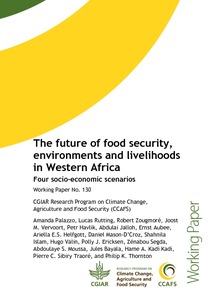Resource information
This working paper examines the development of regional socioeconomic scenarios for West Africa’s development, agriculture, food security and climate impacts. We present four globally consistent regional scenarios framed and outlined by regional experts who crafted narratives and determined key drivers of change. Stakeholders identified the type of actors driving change and the timeline of strategic planning as the most uncertain and most relevant factors of change affecting food security, livelihoods and environments in the region.
The scenarios were linked to the IPCC community’s global Shared Socio-economic Pathways (SSPs) and quantified using two agricultural economic models, GLOBIOM and IMPACT, in interaction with drivers outlined by the SSPs and guided by semi-quantitative information from the stakeholders. The quantification of the scenarios has provided additional insights into the possible development of Western Africa in the context of a global economy as well as how the agricultural sector may be affected by climate change. The scenarios process highlights the need to combine socio-economic and climate scenarios, to base these scenarios in regional expertise, and ways to make scenarios useful for policy design.
The objective of this working paper is to provide scenarios for future regional development for West Africa on the future of food security, environment, and rural livelihoods as well as offer details of the multi-stakeholder scenarios development process. Using both qualitative and quantitative scenarios we provide insights into the possible development of West Africa as well as a scalable framework for regional decision makers and the scientific community to use scenarios to build and test policies to make them more robust in the face of future uncertainty.
In these scenarios, strong economic development increases food security and agricultural development. Increased crop and livestock productivity may lead to an expansion of agricultural areas within the region but productivity improvements may reduce the pressure on land elsewhere. In the context of a global economy, West Africa remains a large consumer and producer of a selection of commodities. However, the growth in population in combination with rising incomes may lead to increases in the region’s imports. For West Africa, climate change is likely to have negative effects on both crop yields and grassland productivity, and lack of investment in agriculture may exacerbate them.
The aim of the regional scenarios is provide challenging contexts for policy makers to test and develop a range of national and regional policies. To date, the scenarios have been used in a number of policy design processes which include collaborations with ECOWAS priority setting, the National Plan for the Rural Sector for Burkina Faso (PNSR), and district and national level policy processes in Ghana.


